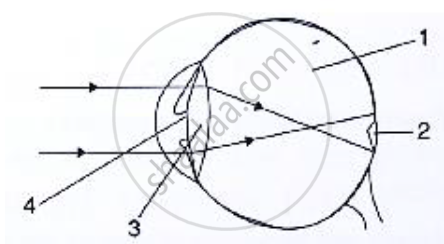Advertisements
Advertisements
Question
Enumerate the common defects of vision, their causes and the possible methods of correcting them.
Solution
| Defect of vision | Cause | Corrective measure |
| Myopia | Lengthening of eye ball from front to back or the lens is too curved. | Using suitable concave lens |
| Hyperopia | Shortening of eye ball from front to back or the lens is too flat. | Using suitable convex lens |
| Astigmatism | Uneven curvature of the cornea | Using suitable cylindrical lenses |
| Presbyopia | Loss of flexibility of lens | Using suitable convex lens |
| Cataract | Lens turning opaque | Surgery or use of convex lens or implantation of plastic lens. |
| Colour blindness | Genetic defect | No control measure |
| Squint | Formation of cross-eye | Surgery and suitable exercise |
APPEARS IN
RELATED QUESTIONS
Explain two possible reasons of myopia. How can it be corrected? Explain with a suitable diagram.
The kind of lens required to correct Myopia
What is the scientific name of
short-sightedness
Where is the near point of a person suffering from hypermetropia (or long-sightedness)?
The near-point of a person suffering from hypermetropia is at 50 cm from his eye. What is the nature and power of the lens needed to correct this defect? (Assume that the near-point of the normal eye is 25 cm).
A young man has to hold a book at arm's length to be able to read it clearly. The defect of vision is:
(a) astigmatism
(b) myopia
(c) presbyopia
(d) hypermetropia
Name the following:
The photosensitive pigment present in the rods of the retina.
Differentiate between members of the following pair with reference to what is asked in the bracket.
Rods and cones (sensitivity).
Given below is a diagram depicting a defect of the human eye. Study the same and answer the question that follow:

Name the defect shown in the diagram.
What is Hypermetropia (far sightedness)?
List two causes of presbyopia. Draw labelled diagram of a lens used for the correction of this defect of vision.
A person is unable to see objects distinctly placed within 50 cm from his eyes.
(a) Name the defect of vision the person is suffering from and list its two possible causes.
(b) Draw a ray diagram to show the defect in the above case.
(c) Mention the type of lens used by him for the correction of the defect and calculate its power. Assume that the near point for the normal eye is 25 cm.
(d) Draw a labeled diagram for the correction of the defect in the above case.
In what two whys is a yellow spot different from the blind spot?
Study the following diagram carefully and then answer the questions that follow. The diagram is depicting a defect of the human eye :

(i) Identify the defect shown in the diagram.
(ii) Give two possible reasons for the above defect.
Given below is a diagrammatic representation of a defect of the human eye:

(i) Identify the defect.
(ii) Mention two reasons for the above defect.
(iii) State how the defect can be rectified.
(iv) Name the part of the eye responsible for maintaining the shape of the eyeball.
Which of the following statement is correct?
Observe the figure whether it is correct or not and explain the phenomenon.

A person is unable to see clearly a poster fixed on a distant wall. He however sees it clearly when standing at a distance of about 2 m from the wall.
- Draw ray diagram to show the formation of image by his eye lens when he is far away from the wall.
- List two possible reasons of this defect of vision.
- Draw ray diagram to show the correction of this defect using appropriate lens.
Observe the following diagram and answer questions following it:

- Identify the defect of vision shown.
- List its two causes.
- Name the type of lens used for the correction of this defect.
